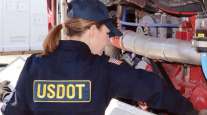Industry Pressing for CSA Changes, Former FMCSA Administrator Says
This story appears in the June 18 print edition of Transport Topics.
SAN DIEGO — Compliance, Safety, Accountability is “here to stay,” but it’s likely that changes are ahead for the program as industry pressure continues to mount, a former administrator of the Federal Motor Carrier Safety Administration said.
The FMCSA is now “getting pushed on all sides, not only from trucking interests but also from brokers and shippers,” Annette Sandberg, who led FMCSA from 2003 to 2006, told conferees on June 5 at Qualcomm’s Vision 2012 Management Conference here.
CSA is having a “huge” effect on shippers and brokers, who face a rising number of lawsuits alleging negligent hiring of carriers “just based on the scores out there that probably are not an accurate reflection of a carrier’s safety profile,” said Sandberg, now president of TransSafe Consulting.
Sandberg said crash accountability remains a top industry concern regarding CSA’s Safety Measurement System.
The agency was “on the cusp” of dealing with the issue but withdrew after public interest groups argued that crash victims should have a say in the process, she said.
“To me, the best person to determine crash accountability is the police officer at the scene,” said Sandberg.
For some crashes, it’s very difficult to determine who was at fault by looking at the police crash report. “Let’s set those aside,” she said.
But in many cases, the party at fault is obvious. When it’s clear to the officer and clear from the witness statements and the evidence at the scene that it was not the trucker’s fault, the agency should remove those incidents from the carrier’s crash score automatically, she said.
Sandberg said FMCSA could hire retired police officers trained in crash investigations to assist the agency with this function.
Another concern with CSA is that the majority of carriers still have no score, she said.
Dave Kraft, director of industry affairs at Qualcomm Enterprise Services, said there are about 770,000 carriers in FMCSA’s database, with about 525,000 showing recent signs that they’re actively doing business.
However, just 94,000 carriers have at least one SMS rating, though FMCSA has said that group is involved with 84% of carrier crashes, Kraft said.
There’s also “a lot of debate” about how effectively these ratings indicate real safety problems, he added.
SMS “is by no means a finished product, it’s a work in progress,” Kraft said.
“Regardless of how you feel about the system, I think CSA is here to stay,” Sandberg said. “What we need to do is work together to get the agency to make it more productive, measure more carriers and make it fair.”
Despite her concerns about CSA, Sandberg acknowledged that the program has had a positive influence on safety.
“There’s still of lot of things to be worked out with it, but it has forced a lot of carriers to really focus on their safety programs and worry about those scores and how they reflect to their shippers and their brokers,” she said.
Members of a safety panel later in the conference echoed that sentiment.
Dean Newell, vice president of safety and driver training at Maverick Transportation, said CSA has directed companies’ attention toward safety.
“That in and of itself is going to make the road safer, in my opinion, whether you agree or disagree with how it works,” he said.
John Spiros, vice president of safety and claims management at Roehl Transport, said the weight of certain violations doesn’t seem to match their severity.
For example, on the Cargo BASIC, or Behavior Analysis and Safety Improvement Category, a strap that’s frayed but not cut is a 10-point violation, he said.
“I believe [CSA] is going to make the roads better . . . but I think some of the methodology does need to change,” Spiros said.
Roehl Transport, Marshfield, Wis., ranks No. 74 on the Transport Topics Top 100 list of the largest U.S. and Canadian for-hire carriers, while Maverick Transportation’s parent company, Maverick USA, based in Little Rock, Ark., ranks No. 96 on the list.
Jeannie Gordon, vice president of compliance at Landstar System Inc., described CSA as “a compliance measurement, not a safety tool.”
She said most of the form and manner violations, for example, “have nothing to do with safety.”
Landstar System, Jacksonville, Fla., ranks No. 8 on the TT Top 100 list of for-hire carriers.
Gordon urged truckers not only to comment on CSA, but also to contact their representatives in Congress and share their concerns about the program.
“We really have to focus on CSA,” she said. “We have to stay on top of it, because if we don’t, we’re going to have a product we’re not going to be happy with as an industry.”



